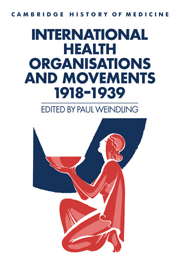Book contents
- Frontmatter
- Contents
- Notes on the contributors
- Preface
- List of abbreviations
- 1 Introduction: constructing international health between the wars
- 2 ‘Custodians of the sacred fire’: the ICRC and the postwar reorganisation of the International Red Cross
- 3 Red Cross organisational politics, 1918–1922: relations of dominance and the influence of the United States
- 4 The League of Nations Health Organisation
- 5 Assistance and not mere relief: the Epidemic Commission of the League of Nations, 1920–1923
- 6 Wireless wars in the eastern arena: epidemiological surveillance, disease prevention and the work of the Eastern Bureau of the League of Nations Health Organisation, 1925–1942
- 7 Social medicine at the League of Nations Health Organisation and the International Labour Office compared
- 8 The Social Section and Advisory Committee on Social Questions of the League of Nations
- 9 ‘Uncramping child life’: international children's organisations, 1914–1939
- 10 The International Health Division of the Rockefeller Foundation: the Russell years, 1920–1934
- 11 The cycles of eradication: the Rockefeller Foundation and Latin American public health, 1918–1940
- 12 The Pasteur Institutes between the two world wars. The transformation of the international sanitary order
- 13 Internationalising nursing education during the interwar period
- 14 Mental hygiene as an international movement
- 15 Mobilising social knowledge for social welfare: intermediary institutions in the political systems of the United States and Great Britain between the First and Second World Wars
- Index
- Cambridge History of Medicine
1 - Introduction: constructing international health between the wars
Published online by Cambridge University Press: 05 November 2009
- Frontmatter
- Contents
- Notes on the contributors
- Preface
- List of abbreviations
- 1 Introduction: constructing international health between the wars
- 2 ‘Custodians of the sacred fire’: the ICRC and the postwar reorganisation of the International Red Cross
- 3 Red Cross organisational politics, 1918–1922: relations of dominance and the influence of the United States
- 4 The League of Nations Health Organisation
- 5 Assistance and not mere relief: the Epidemic Commission of the League of Nations, 1920–1923
- 6 Wireless wars in the eastern arena: epidemiological surveillance, disease prevention and the work of the Eastern Bureau of the League of Nations Health Organisation, 1925–1942
- 7 Social medicine at the League of Nations Health Organisation and the International Labour Office compared
- 8 The Social Section and Advisory Committee on Social Questions of the League of Nations
- 9 ‘Uncramping child life’: international children's organisations, 1914–1939
- 10 The International Health Division of the Rockefeller Foundation: the Russell years, 1920–1934
- 11 The cycles of eradication: the Rockefeller Foundation and Latin American public health, 1918–1940
- 12 The Pasteur Institutes between the two world wars. The transformation of the international sanitary order
- 13 Internationalising nursing education during the interwar period
- 14 Mental hygiene as an international movement
- 15 Mobilising social knowledge for social welfare: intermediary institutions in the political systems of the United States and Great Britain between the First and Second World Wars
- Index
- Cambridge History of Medicine
Summary
Whereas the development of welfare states has been the subject of sustained academic scrutiny, international aspects of welfare have been much neglected. It is possible for national systems to retain a diversity of locally administered elements (for example, involving municipalities, social insurance corporations or occupational health schemes) while providing centralised funding and administrative and legal frameworks. But international organisations have vital roles and demand far greater attention from historians and social scientists than they have hitherto received.
As any localised system could suffer from inequalities and lack resources, and states could manipulate health and welfare issues for the purposes of political expediency, international organisations became an attractive option for promoting reforms. International bodies may remedy local deficiencies, set optimal standards and improve the quality of the systems of care and the training of personnel. While some of these functions can be fulfilled by the state, it should be recognised that the state as a provider of welfare can be problematic, because its multifunctional character may render health and welfare low political priorities, or distort welfare as caught up in the politics of interest groups and financial expediency. The interwar rise of fascist and kindred authoritarian regimes that perverted welfare systems for purposes of political discrimination and genocide was in marked contrast to the humane ideals of internationalists.
- Type
- Chapter
- Information
- Publisher: Cambridge University PressPrint publication year: 1995
- 2
- Cited by



